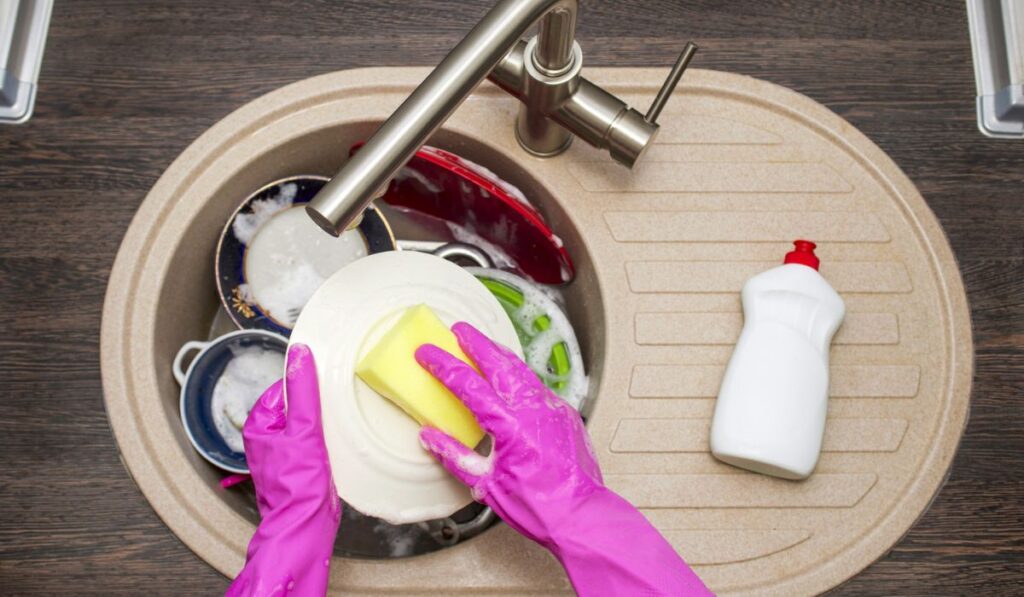You’re in your kitchen ready to tackle a growing pile of dishes, and you notice that you’ve run out of dish soap. What can you do in this sticky situation? Can you use hand soap to clean the dishes?
You can use hand soap to wash your dishes. However, you have to rinse the dishes thoroughly afterward because hand soaps contain harmful chemicals that, if ingested, can cause health issues. The same applies to laundry detergent.
Read on to find out more about hand soap, particularly the chemicals they contain and how you can use them safely to wash your dishes. We’ll also look at the potential to use laundry detergent, if it comes to that!
Is It Safe to Wash Dishes With Hand Soap?

The short answer is: Yes. Hand soap is antibacterial, meaning it will kill all the germs and bacteria on your dishes. However, hand soap may be unable to remove grease and tough stains from utensils the same way dish soaps do.
Hand soaps are designed for washing hands. They usually moisturize the skin and have an appealing fragrance.
There are various types of hand soaps you can choose from depending on the properties you’re looking for. Some of these soaps are formulated for dry skin, while others are used to heal the skin.
Using hand soap to clean your dishes will leave a thin, slimy layer on them. This layer is difficult to rinse and will require you to put in some extra effort. The soaps also tend to leave the dishes smelling unusual, thanks to their fragrance.
The slimy effect left by hand soaps on dishes is because of the glycerin added to these soaps. Glycerin is not easy to wash off.
The question you might be asking yourself now is whether hand soaps are safe for washing dishes. The chemicals in hand soaps are often not safe.
Some of these soaps contain toxins that can remain on your dishes during washing. However, if you can get antibacterial hand soap free from toxins, preservatives, or other such chemicals, you can safely use it to wash your dishes.
But even after using such a soap, you should rinse the dishes more than once to remove all soap traces.
Typical Hand Soap Ingredients
The ingredients of hand soaps include:
SLES and SLS
Most hand soaps contain sodium laureth sulfate (SLES) and sodium lauryl sulfate (SLS). These compounds foam easily and are present in most body care products like laundry detergents, toothpaste, body washes, and shampoos.
These compounds get contaminated during their manufacturing process, making them toxic to humans. SLS can cause serious medical problems, including cancer, organ toxicity, reproductive toxicity, cellular or biological changes, endocrine disruption, and eye and skin irritation.
Urea
Urea is the component of hand soaps that gives them the moisturizing and skin-toning properties. Urea has a water-binding property that helps with treating skin dryness and helps with exfoliation.
Unfortunately, when urea is consumed, it can cause joint pains and heart irregularities, and it can interfere with your immune system. Soaps with urea have names like sodium hydroxymethylglycinate, DMDM hydantoin, and imidazolidinyl urea on their labels.
Parabens
Parabens are preservatives added to cosmetic products to prevent bacterial growth in them. They are present in nearly all beauty products. The problem with parabens is that they disrupt hormonal activity because they mimic estrogen.
They can trigger excessive division of breast cells, leading to the development of tumors. That’s why parabens are linked with reproductive issues and breast cancer.
Methylchloroisothiazolinone and methylisothiazolinone
Methylchloroisothiazolinone and methylisothiazolinone (MCI/MI) are also preservatives used in hand soaps. These two chemicals cause neurotoxicity, respiratory issues, and lung problems.
Dyes
Nearly all hand soaps are colored to make them attractive. The chemicals used in coloring soaps are often harmful to your health.
Fragrance
Just like dyes, fragrances are also added to nearly all hand soaps. If you check the label of most hand soaps, you’ll see the word “fragrance,” but the actual name of the chemical used is never disclosed.
Fragrances are mainly phthalates and are known to cause many health problems such as breast cancer, liver cancer, reduction in sperm count, neurotoxicity, and endocrine disruption.
1,4-Dioxane
Almost all hand soaps contain 1,4-dioxane. This chemical is known to cause cancer. If you see names like Ceteareth, Oleth, Myreth, or Laureth on a product label, know that it contains 1,4-dioxane.
Can You Use Laundry Detergent to Wash Dishes?

Laundry detergents shouldn’t be used to wash dishes in the sink or dishwasher. This is because detergents contain ingredients that produce suds. Suds can cause a mess on your floor if they leak from the dishwasher.
However, if you’ve run out of dishwashing soap, you can use a laundry detergent as a temporary substitute.
If laundry detergent is the only alternative you have, make sure you wear gloves before using it. Also, remember to use just a small amount of the detergent (about two teaspoons of the detergent is enough for a sink full of water). After washing the dishes, make sure you rinse them thoroughly.
